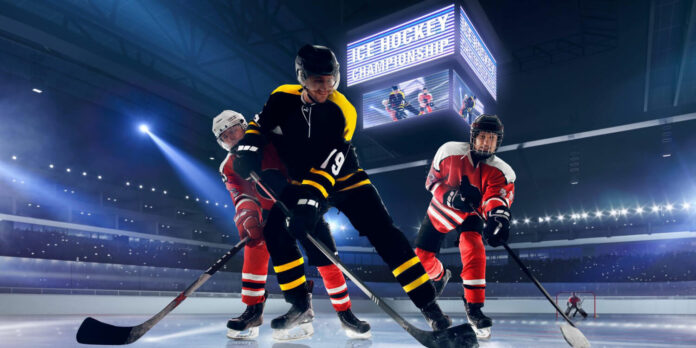Hockey is one of the fastest and most exhilarating sports in the world, and it captivates fans with its high-speed action and intensity.
Everyone watches it, so you might be wondering: how long are hockey games typically? The answer isn’t as straightforward as it seems, as several factors affect the duration of a game.
Regulation Time in Professional Hockey
In professional leagues like the NHL (National Hockey League), the game duration consists of three 20-minute periods, making for a total of 60 minutes of playtime. However, this does not mean a hockey game will last exactly 60 minutes.
Several pauses and interruptions throughout the game extend its length, including stoppages for penalties, injuries, timeouts, and TV commercials.
So, how long does an NHL hockey game last in real time?
On average, an NHL game lasts around 2 hours and 20 minutes to 2 hours and 45 minutes.
Why Does the Game Take Longer?
There are many factors that add time to a hockey game:
- Intermissions: Between each of the three periods, there are 15- to 20-minute intermissions where the ice is resurfaced, and players take a break. In the NHL, these intermissions are about 18 minutes long.
- Commercial Breaks: Televised games include commercial breaks during stoppages of play. These can add several minutes to the overall game length.
- Penalties and Stoppages: Referees stop play for penalties, injuries, icing, and offside calls, all of which extend the game beyond the actual 60 minutes of playtime.
- Overtime: If the game is tied at the end of regulation, teams play a 5-minute sudden-death overtime in the regular season games. If no one scores, the game moves to a shootout. In the playoffs, overtime periods are 20 minutes long, and teams keep playing until someone scores, which can add significant time to a game.
Playoff Games: Extra Drama, Extra Time
The length of playoff games can vary greatly due to the possibility of multiple overtime periods. Playoff overtime lasts 20 minutes, and teams play until one side scores. This means playoff games can easily stretch to 3 or 4 hours, and in rare instances, even longer.
For example, the longest NHL game ever occurred in 1936, between the Detroit Red Wings and Montreal Maroons, lasting an incredible 176 minutes and 30 seconds of game play — that’s almost three full games in one!
Other Hockey Leagues and Their Game Lengths
While NHL games are the most well-known, there are many other leagues with different formats, including international tournaments, collegiate leagues, and youth hockey. Each may have its own variations on game length.
1. International Hockey (IIHF)
In international hockey, games follow a similar structure to the NHL with three 20-minute periods. However, there may be slight differences in rules, such as overtime procedures or commercial breaks. The overall game length tends to be roughly the same as the NHL, around 2 hours and 30 minutes.
2. Minor League Hockey
Games in minor leagues like the AHL (American Hockey League) or ECHL (East Coast Hockey League) follow the same 60-minute structure but often have fewer commercial breaks, making their game durations closer to the 2-hour mark.
3. Collegiate Hockey (NCAA)
College hockey in the United States typically mirrors the NHL in terms of game duration. There are three 20-minute periods, with intermissions between each. However, college games tend to have shorter intermissions and fewer commercial breaks, so games may last 2 to 2.5 hours.
4. Youth and Recreational Hockey
Youth and recreational hockey leagues usually feature shorter game lengths to accommodate younger players. Common formats include:
- Three 15-minute periods or three 12-minute periods for younger age groups.
- Running clocks (where the clock doesn’t stop for every stoppage of play) to ensure the game finishes on time, particularly in recreational leagues.
These games typically last 1 to 1.5 hours in real time, depending on the age group and league rules.
Additional Factors That Can Influence Game Duration
While the standard format of hockey is fairly consistent, several additional factors can influence the total game time:
- Level of Play: Professional and college hockey games tend to be longer due to commercial breaks, extended stoppages for reviews, and potentially lengthy overtime periods. Youth and recreational games, on the other hand, are designed to be shorter to accommodate player stamina and rink schedules.
- Overtime and Shootouts: Regular-season games that are tied after regulation move into overtime and, if necessary, a shootout. This can add anywhere from 5 to 20 minutes to the game. Playoff games, especially in the NHL, can run significantly longer due to the possibility of multiple overtime periods.
- Television Coverage: Televised games often take longer due to scheduled commercial breaks and TV timeouts. These pauses don’t occur in non-televised or youth games, which speeds up the game.
- Delays Due to Injuries or Fights: While not common, serious injuries or prolonged on-ice fights can cause delays. Medical attention, referee discussions, and other game stoppages can add unexpected time.
Final Thoughts: How Long are Hockey Games?
For most professional hockey games, plan on being at the rink or in front of your TV for about 2.5 to 3 hours.
Youth and recreational games will be shorter, generally taking 1 to 1.5 hours. Playoff games, especially in the NHL, are unpredictable and can last much longer depending on the score at the end of regulation.




